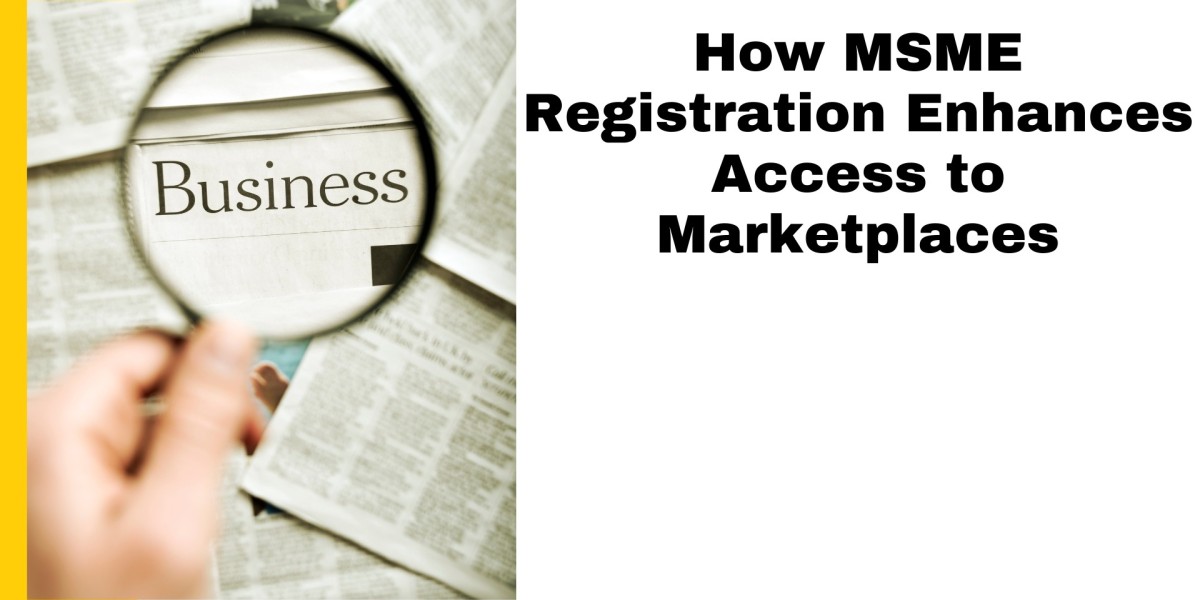Micro, Small, and Medium Enterprises (MSMEs) are pivotal to India's economic landscape, contributing significantly to employment, innovation, and GDP. Registering as an MSME through the Udyam portal offers businesses a multitude of advantages, particularly in expanding their reach to various marketplaces. Here's how MSME registration facilitates enhanced access to both domestic and international markets.
1. Increased Credibility and Trust
An MSME registration certificate serves as an official recognition from the government, enhancing a business's credibility. This recognition instills trust among customers, suppliers, and partners, making it easier for MSMEs to establish relationships and enter new markets.
2. Access to Government e-Marketplace (GeM)
Registered MSMEs are eligible to sell their products and services on the Government e-Marketplace (GeM), a platform that facilitates procurement by various government departments and organizations. This opens up substantial business opportunities and provides a steady demand for MSME offerings.
3. Participation in Trade Fairs and Exhibitions
The government often organizes trade fairs, exhibitions, and buyer-seller meets to promote MSMEs. Registered enterprises receive invitations and support to participate in these events, providing them with exposure to larger markets and potential clients.
4. Eligibility for Government Schemes and Subsidies
MSME registration makes businesses eligible for various government schemes that aim to promote market access. These include financial assistance for marketing, subsidies for participation in international trade fairs, and support for branding initiatives.
5. Enhanced Access to Finance
Financial institutions often offer preferential lending terms to registered MSMEs, including lower interest rates and collateral-free loans. This financial support enables businesses to invest in marketing, expand their operations, and explore new markets.
6. Digital Training and E-commerce Integration
Initiatives like Walmart Vriddhi have empowered over 58,000 MSMEs by providing digital training and facilitating their integration into e-commerce platforms like Flipkart. Such programs help MSMEs reach a broader customer base and adapt to the digital marketplace.
7. Protection Against Delayed Payments
Under the MSME Development Act, registered enterprises have legal protection against delayed payments from buyers. This ensures better cash flow management, enabling businesses to maintain operations and fulfill market demands effectively.
8. Access to Export Promotion Programs
Registered MSMEs can benefit from export promotion programs that provide financial assistance, training, and market intelligence to help them enter and compete in international markets. These programs aim to enhance the global competitiveness of Indian MSMEs.
9. Simplified Licensing and Approvals
MSME registration simplifies the process of obtaining various licenses and approvals required for business operations. This ease of doing business allows enterprises to focus on market expansion and customer acquisition.
10. Networking Opportunities
Being part of the MSME ecosystem provides access to a network of other small and medium enterprises, industry associations, and support organizations. These connections can lead to collaborations, joint ventures, and shared market opportunities.
11. Market Linkages through Industry Clusters
One of the key initiatives for MSMEs in India is the development of industrial clusters. These clusters act as geographic concentrations of interconnected businesses, suppliers, and associated institutions. When an MSME is registered, it becomes easier to participate in such cluster development programs (CDP) facilitated by the government.
Clusters not only improve productivity through shared infrastructure but also facilitate group marketing, bulk procurement, and joint participation in exhibitions, allowing even micro enterprises to gain access to national and international buyers. MSMEs also receive cluster-specific guidance on compliance and quality certifications, which improves their marketability.
12. Promoting Local to Global Vision
Through campaigns like “Vocal for Local” and One District One Product (ODOP), the government encourages MSMEs to sell local crafts, food products, and textiles nationally and internationally. Udyam-registered businesses under ODOP are given platform visibility, training, and marketing support to scale their products beyond local markets.
In fact, such businesses are often featured in special sections of platforms like Flipkart, Snapdeal, and even international exhibitions under “Make in India.”
The process to apply for MSME Registration
Visit the Udyam Portal: Open your browser's official Udyam Registration portal.
Fill in Business Details: Enter important details like your business name, type, address, and bank account information. Ensure accuracy in the data.
Review and Submit the Form: Review the information to confirm it's correct. After reviewing, apply.
Pay the Registration Fee: Select your payment method and complete the payment for registration.
Receive OTP on Mobile: An OTP will be sent to the mobile number linked with your Aadhaar card.
Enter OTP: Input the OTP sent to your phone to verify your identity.
Complete Registration: Once your details are confirmed, your registration will be completed.
Receive Your Udyam Certificate: Once verified, your Udyam Registration certificate will be generated and sent directly to your email.
Also read:- NIC Code for Udyam Registration.
Conclusion
MSME registration is more than a statutory formality; it's a strategic move that unlocks numerous avenues for market access and business growth. By leveraging the benefits associated with registration, MSMEs can enhance their visibility, credibility, and competitiveness in both domestic and international marketplaces.
If you need assistance with the MSME registration process or want to explore specific programs and platforms that can help your business grow, feel free to ask!








